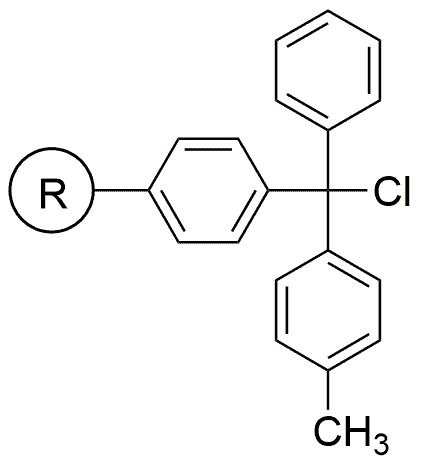4-Methyltrityl chloride resin is widely utilized in research focused on
- Solid-Phase Peptide Synthesis: This resin serves as a crucial support for synthesizing peptides, allowing researchers to easily attach and detach amino acids during the process, enhancing efficiency and yield.
- Drug Discovery: In pharmaceutical research, it aids in the development of new drugs by facilitating the rapid synthesis of compound libraries, enabling quicker screening for potential therapeutic candidates.
- Organic Synthesis: The resin is valuable in organic chemistry for creating complex molecules, providing a stable platform for various reactions while minimizing side products.
- Bioconjugation: It is used in bioconjugation techniques to link biomolecules, such as proteins and nucleic acids, to create targeted therapies or diagnostic tools, improving specificity and efficacy.
- Research and Development: This resin supports a wide range of R&D applications in academic and industrial laboratories, offering flexibility and reliability in experimental setups, which is essential for innovative discoveries.
General Information
Properties
Safety and Regulations
Applications
4-Methyltrityl chloride resin is widely utilized in research focused on
- Solid-Phase Peptide Synthesis: This resin serves as a crucial support for synthesizing peptides, allowing researchers to easily attach and detach amino acids during the process, enhancing efficiency and yield.
- Drug Discovery: In pharmaceutical research, it aids in the development of new drugs by facilitating the rapid synthesis of compound libraries, enabling quicker screening for potential therapeutic candidates.
- Organic Synthesis: The resin is valuable in organic chemistry for creating complex molecules, providing a stable platform for various reactions while minimizing side products.
- Bioconjugation: It is used in bioconjugation techniques to link biomolecules, such as proteins and nucleic acids, to create targeted therapies or diagnostic tools, improving specificity and efficacy.
- Research and Development: This resin supports a wide range of R&D applications in academic and industrial laboratories, offering flexibility and reliability in experimental setups, which is essential for innovative discoveries.
Documents
Safety Data Sheets (SDS)
The SDS provides comprehensive safety information on handling, storage, and disposal of the product.
Product Specification (PS)
The PS provides a comprehensive breakdown of the product’s properties, including chemical composition, physical state, purity, and storage requirements. It also details acceptable quality ranges and the product's intended applications.
Certificates of Analysis (COA)
Search for Certificates of Analysis (COA) by entering the products Lot Number. Lot and Batch Numbers can be found on a product’s label following the words ‘Lot’ or ‘Batch’.
Número de catálogo
Número de lote/lote
Certificates Of Origin (COO)
This COO confirms the country where the product was manufactured, and also details the materials and components used in it and whether it is derived from natural, synthetic, or other specific sources. This certificate may be required for customs, trade, and regulatory compliance.
Número de catálogo
Número de lote/lote
Safety Data Sheets (SDS)
The SDS provides comprehensive safety information on handling, storage, and disposal of the product.
DownloadProduct Specification (PS)
The PS provides a comprehensive breakdown of the product’s properties, including chemical composition, physical state, purity, and storage requirements. It also details acceptable quality ranges and the product's intended applications.
DownloadCertificates of Analysis (COA)
Search for Certificates of Analysis (COA) by entering the products Lot Number. Lot and Batch Numbers can be found on a product’s label following the words ‘Lot’ or ‘Batch’.
Número de catálogo
Número de lote/lote
Certificates Of Origin (COO)
This COO confirms the country where the product was manufactured, and also details the materials and components used in it and whether it is derived from natural, synthetic, or other specific sources. This certificate may be required for customs, trade, and regulatory compliance.


